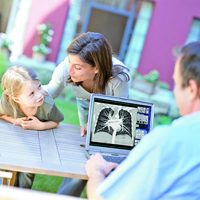Syngo WebSpace represents the newest innovation in client-server solutions for CT applications. Traditionally, large volume thin-slice data has been stored for days on the CT scanner and time is lost when retrieving them from some picture archive and communications systems (PACS). Syngo WebSpace enables storage for hundreds of thin-slice data cases and large thin-slice data sets (up to 5,000 slices) that are immediately available for 2D, 3D and 4D interactive reading using Siemens syngo InSpace 4D software. All rendering takes place on the server, providing users with advanced processing speed. Ideally suited for short-term storage of thin-slice CT data, syngo WebSpace gives users rapid access to thin-slice data, while freeing up the CT scanner database.
 Syngo WebSpace facilitates from five to 20 concurrent sessions, depending on the server configuration, from any number of users throughout the hospital network and via secure access from remote locations. Medical facilities can access multiple servers to further expand the possible number of concurrent sessions. This offers a very cost-effective solution for fast image distribution and high availability, routine clinical post-processing. Once syngo WebSpace is connected to the central server, a PACS workplace or PC can be turned into a processing workplace. First installations of syngo WebSpace are already running at leading institutions such as the University of Erlangen, the University of Munich and Johns Hopkins University in Baltimore.
"Siemens syngo WebSpace represents what customers are demanding from us today: an IT-solution for processing CT data that allows flexible use of different modalities and within different workflows", said Dr. Bernd Montag, head of Computed Tomography at Siemens Medical Solutions. "The syngo WebSpace's client-server architecture makes it possible for every modern computer running Windows to have the CT data immediately and nearly everywhere available so that the physicians' expert knowledge can be better used in health care organizations and on patients."
Syngo WebSpace facilitates from five to 20 concurrent sessions, depending on the server configuration, from any number of users throughout the hospital network and via secure access from remote locations. Medical facilities can access multiple servers to further expand the possible number of concurrent sessions. This offers a very cost-effective solution for fast image distribution and high availability, routine clinical post-processing. Once syngo WebSpace is connected to the central server, a PACS workplace or PC can be turned into a processing workplace. First installations of syngo WebSpace are already running at leading institutions such as the University of Erlangen, the University of Munich and Johns Hopkins University in Baltimore.
"Siemens syngo WebSpace represents what customers are demanding from us today: an IT-solution for processing CT data that allows flexible use of different modalities and within different workflows", said Dr. Bernd Montag, head of Computed Tomography at Siemens Medical Solutions. "The syngo WebSpace's client-server architecture makes it possible for every modern computer running Windows to have the CT data immediately and nearly everywhere available so that the physicians' expert knowledge can be better used in health care organizations and on patients."
Siemens Medical Solutions is one of the world's largest suppliers to the healthcare industry. The company is known for bringing together innovative medical technologies, healthcare information systems, management consulting, and support services, to help customers achieve tangible, sustainable, clinical and financial outcomes. From imaging systems for diagnosis, to therapy equipment for treatment, to patient monitors to hearing instruments and beyond, Siemens innovations contribute to the health and well-being of people across the globe, while improving operational efficiencies and optimizing workflow in hospitals, clinics, home health agencies, and doctors' offices. Employing approximately 33.000 people worldwide and operating in more than 120 countries, Siemens Medical Solutions reported sales of 7.6 billion EUR, orders of 8.6 billion EUR and group profit of 1 billion EUR for fiscal 2005. Further information can be found under: www.siemens.com/medical